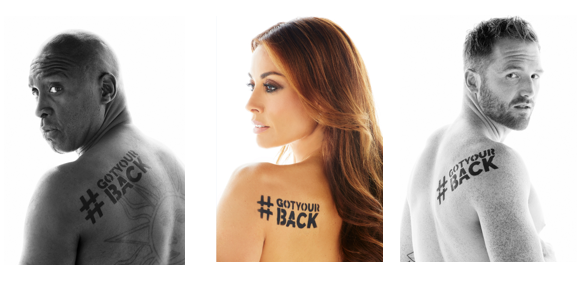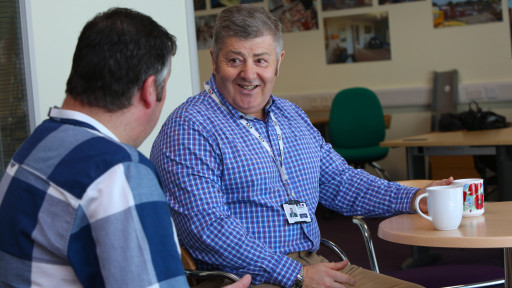
Have you heard of the ‘Got Your Back’ Campaign launched by the SSAFA?
New research published by SSAFA, The Armed Forces charity, has revealed that less than 1% of the personnel currently serving in the United Kingdom’s Armed Forces or veterans would seek help from a charity if they found themselves in need.
SSAFA, the oldest, national, tri-service military charity in the UK which has provided support to serving personnel, veterans and their families for more than 130 years, has revealed that those who are serving and who have served in our Armed Forces can find it extremely challenging to admit that they have a problem and cannot cope alone.
When asked why they would delay asking for help, over half (58%) of respondents stated that they felt that they should be equipped to deal with problems themselves, rather than rely on others. A further third of respondents (32.3%) indicated that they didn’t feel it was in their character to ask for help.
Over 40% (42%) of respondents included within the poll stated that they would only acknowledge that they have a problem and come forward for help if they felt that their life would otherwise be at risk, indicating that they are being pushed to the brink before considering seeking support.
Off the back of the survey’s concerning results, SSAFA has launched the ‘Got Your Back’ campaign, which aims to address the ‘grin and bear it’ mentality which remains strong within the Armed Forces community. Although the majority of veterans transition and do well in subsequent civilian careers and life, the campaign is targeting those who struggle, asking them not to let their pride stand in the way of asking for help.
David Jones, from Kent who served in the Royal Marines, came to SSAFA for help when he felt he could no longer cope alone.
He said: “After coming home from Afghanistan I thought my battle days were over but I didn’t for see the new challenges that I’d face going back to civilian life. I really struggled with the transition period, I just didn’t have the energy to play with my kids or get out of bed, so it was no surprise when I was diagnosed with PTSD.
“It took me a very long time to accept that I had absolutely no choice but to come to SSAFA for help and I’ve never regretted that decision but I do regret not doing it sooner.
“I could have made life easier for us much earlier than I actually did but at the time I just couldn’t bring myself to swallow my pride.”
Sir Andrew Gregory, chief executive, SSAFA says:
“Although the majority of veterans transition successfully, SSAFA’s new research has identified a concerning percentage of veterans and serving personnel who are extremely reluctant to come forward for support if they need it.
“The research has confirmed the charity’s suspicions that younger, working-age veterans who the charity is supporting tend to come to SSAFA only once they have hit rock bottom. When we ask them why they have waited so long before seeking assistance, the answer is very often that they felt too proud to ask.
“It is much easier for SSAFA to help a beneficiary get his or her life back on track at the beginning of their difficulties – which could materialise for many different reasons, rather than further down the line once their issues have snowballed.
“SSAFA understands that our soldiers, sailors, airmen and airwomen are resilient characters. Whilst serving the Nation they become fitter, more robust and more self-sufficient; they are rightly proud of their role and of themselves.
“SSAFA’s Got Your Back campaign has a simple and clear message; ‘Those who have served this country have protected our backs; don’t be too proud now to ask us to protect yours. Please call us.”
The research, which was carried out for SSAFA by One Poll, looked specifically at what type of problems the Armed Forces community would avoid asking for help with. 33% would not seek support for financial hardship. Just over 20% (21%) flagged that they would not ask for help if struggling from mental health issues, with a further 19% indicating that they would rather deal with an addiction problem alone, rather than ask for support.
Disappointingly the statistics also showed that nearly 40% (39%) did not feel valued by society during their time in the Armed Forces.
The following UK’s best known Television and sports personalities have supported the campaign including: Luke Pasqualino, Melanie Sykes, Nigel Benn, Stephen Graham, Ant Middleton, Gemma Atkinson, Jorgie Porter, Jenni Falconer, Kate Wright, Chloe Lewis, Will Satch, and Danielle Armstrong to create powerful visual representations of support for the Armed Forces, shot by leading photographer, Nicky Johnston.
Commenting on the launch of the campaign, former boxing world champion, Nigel Benn who served in the British Army for four years said:
“Having served in the army, I’ve seen first-hand the problems that some people face when they leave the Forces and have to go it alone. It’s a really difficult situation to be in, you might be struggling but it’s so hard to hold your hands up and ask for help, especially when you’ve been trained to get on with the job.
“If you’re in the forces and need extra support or a veteran finding it tough to cope, please get in touch with SSAFA, they have your back.”
Currently serving members of the Armed Forces, veterans and their families in need can contact SSAFA’s Forcesline on 0800 731 4880 or via email at www.ssafa.org.uk/gotyourback. Forcesline is a free and confidential helpline and email service that provides support and advice and operates independently from the military chain of command.



